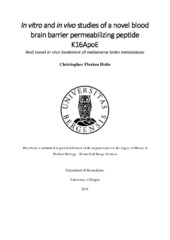In vitro and in vivo studies of a novel blood brain barrier permeabilizing peptide K16ApoE
Master thesis

Åpne
Permanent lenke
https://hdl.handle.net/1956/13011Utgivelsesdato
2016-05-30Metadata
Vis full innførselSamlinger
Sammendrag
Brain metastasis is a common and severe complication arising in up to 40 % of cancer patients. The prognoses for patients with brain metastases are dismal, with a median treated survival of around 10 months. Treatment of brain metastases is mostly limited to surgery and radiotherapy, as an intact blood brain barrier (BBB) effectively protects smaller tumors from chemotherapeutic agents. This means that even if there would be effective chemotherapy treatment regimens for metastases elsewhere in the body, brain metastases would not be affected by such strategies until late stages of cancer development, when the BBB is disrupted. The prevalence of metastatic melanoma has been increasing steadily the last years accounting for 10 % of all brain metastatic cancers. Advanced stage melanoma patients are commonly treated with targeted inhibitors, such as vemurafenib (a small molecule inhibitor, tailored to have a higher affinity to the mutated BRAF kinase). However an intact BBB then prevents the brain metastases from being affected by vemurafenib as well as most chemotherapeutic agents. Based on this a novel BBB permeabilizing peptide was of great interest for the work done in this thesis. The peptide is a combination of the low density lipoprotein receptor binding domain of ApolipoproteinE, and a 16 Lysine tail, which was named K16ApoE. In this study the in vitro mechanisms of K16ApoE was studied. Thereafter the ability of opening the BBB by the peptide was investigated, followed by a pilot study combining vemurafenib and K16ApoE in a small animal tumor model. Cell lines exposed to K16ApoE showed a high degree of cytotoxicity at prolonged exposures of high doses, by affecting cell viability and causing lytic cell death. However lower doses were in general tolerated by the cells. Scanning electron microscopy showed that the peptide caused damages to confluent endothelial cell monolayers likely by inducing lytic cell death. In contrast transmission electron microscopy showed the peptide did not affect cell-cell junctions. DCE-MRI on mice after intravenous administration of 200 μg of K16ApoE showed that the BBB was opened at already 10 minutes after injection, and was permeable at least 2 hours after injection. In animals given 100 μg of peptide the BBB was also permeabilized 10 minutes after injection of the peptide. 10 The pilot treatment study using the xenograft mouse model for brain-metastatic melanoma, indicated a treatment effect when co-administering the peptide and a chemotherapeutic agent. The promising results of this study indicate the potential value of K16ApoE as a therapeutic strategy in brain metastatic cancers. Following this study full scale pre-clinical studies will follow, and based upon those the peptide may move forward towards clinical safety studies, and clinical studies in turn.